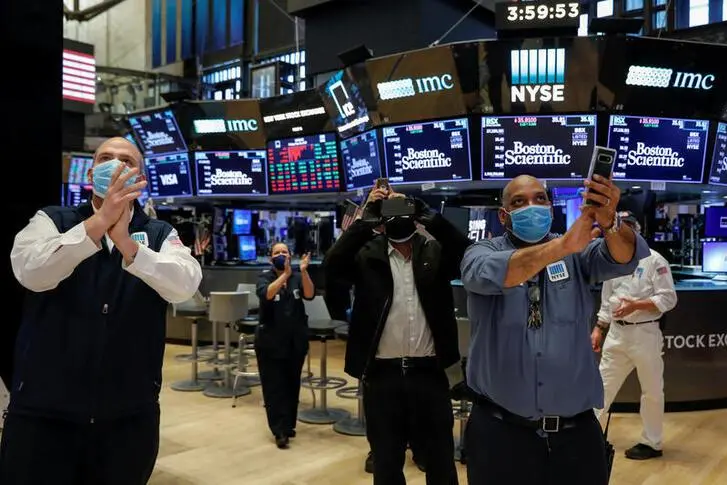PHOTO
Both the Nasdaq and the S&P 500 managed to make up for the early coronavirus disease (COVID-19) pandemic losses and reach new highs. The Dow Jones was within a smidgeon of compensating for the health-crisis-induced losses.
August 2020 looks set to record the strongest rally since 1986 across the board. The unprecedented US Federal Reserve (Fed) stimulus generously injected liquidity into the market. And other markets across the globe followed the American lead.
Thus, is the macro picture: Drilling down though, there are clear winners and losers. Tech stocks clearly led the post-March rally. Most companies in the S&P 500 remained lower than their pre-pandemic levels, while the tech stocks rallied.
Apple, Amazon, Google parent Alphabet, Microsoft, and Facebook make up 20 percent of the S&P 500’s value and accounted for one-third of the index’s gain since March. The gap between laggards and winners exceeded $14 trillion, an amount equal to two-thirds of US gross domestic product (GDP) in 2019.
There was a rush for tech companies emboldened by gains to list on stock exchanges.
The pre-eminence of techs is understandable, as working from home as well as online shopping and communications has dominated work and lives for many people due to the pandemic and its lockdowns. There was already a trend toward a more tech-based lifestyle before COVID-19, but it clearly accelerated due to the outbreak.
This new era has prompted many tech companies to list on stock exchanges. On Aug. 25, Unity Software Inc., Sumo Logic Inc., JFrog Inc., and Snowflake Inc. announced that they were seeking an initial public offering (IPO), while Asana was opting for a direct listing, as did Spotify in 2018 and Slack in 2019.
Later last week, Chinese business magnate Jack Ma announced he wanted to list his electronic payment company Ant group on the Hong Kong and Shanghai stock exchanges. Ma is looking to raise $30 billion in his IPO, which would bring the total company valuation up to $225 billion, a market cap exceeding that of Bank of America or Citi.
Unlike Alibaba, Ma does not want to list in the US fearing the unpredictability of US-China relations, which has manifested itself with American President Donald Trump’s administration trying to force ByteDance to sell the US entities of TikTok to avoid having their operation suspended.
Over the weekend, China countered the US administration’s guidance by putting artificial intelligence (AI) interface technology on a list of export-controlled products, giving Beijing reviewing powers before the sale of TikTok’s US entities is finalized.
Ma’s? concerns go beyond the national security squabbles between the US and China. He fears that companies listed in America could also be impacted by US sanctions vis-a-vis third-party countries.
If anything, the shenanigans around TikTok have proved how important tech has become. The question remains how sustainable tech valuations are at these levels. According to Bloomberg, the Ant IPO may well push first-time forays into stock markets beyond $57 billion. This compares to $62 billion in 1999 at the height of the tech bubble.
Current tech valuations have often been compared to said tech bubble. However, 2020 cannot be compared to the late 1990s.
First, many of these companies are vastly profitable now, which they were not then. The Wall Street Journal had reported a net profit of $3 billion for Ant during the first part of the year. One only needs to look at the profit-and-loss statements of Apple, Amazon, and the likes to understand just how profitable some (but not all) of the tech companies have become.
Second, tech is the future but maybe not as unabashedly so as it was over the last five months. As our lives move increasingly into the virtual and contactless space, companies will adjust. Retailers and health care companies will have to jump on the bandwagon to survive.
As we move to the second phase of the pandemic, tech stocks will continue to do well, but maybe grow a little less. Others with the ability to survive, especially in the retail and health care space, will adjust. Nothing reflects that better than the fact that Walmart joined Microsoft in its bid to acquire the US operations of TikTok.
Some of the tech stocks, particularly those achieving big profits will have to be reevaluated. One might consider classifying them as value stocks instead of growth stocks going forward.
There is a health warning attached: Not every new tech company will achieve the lofty heights experienced over the last few months. Profitability or the potential thereof, and the needs of a post-pandemic society must be taken into consideration, to separate potential winners from potential losers — particularly when looking at startups and their nifty new ideas.
• Cornelia Meyer is a Ph.D.-level economist with 30 years of experience in investment banking and industry. She is chairperson and CEO of business consultancy Meyer Resources. Twitter: @MeyerResources
Copyright: Arab News © 2020 All rights reserved. Provided by SyndiGate Media Inc. (Syndigate.info).





















